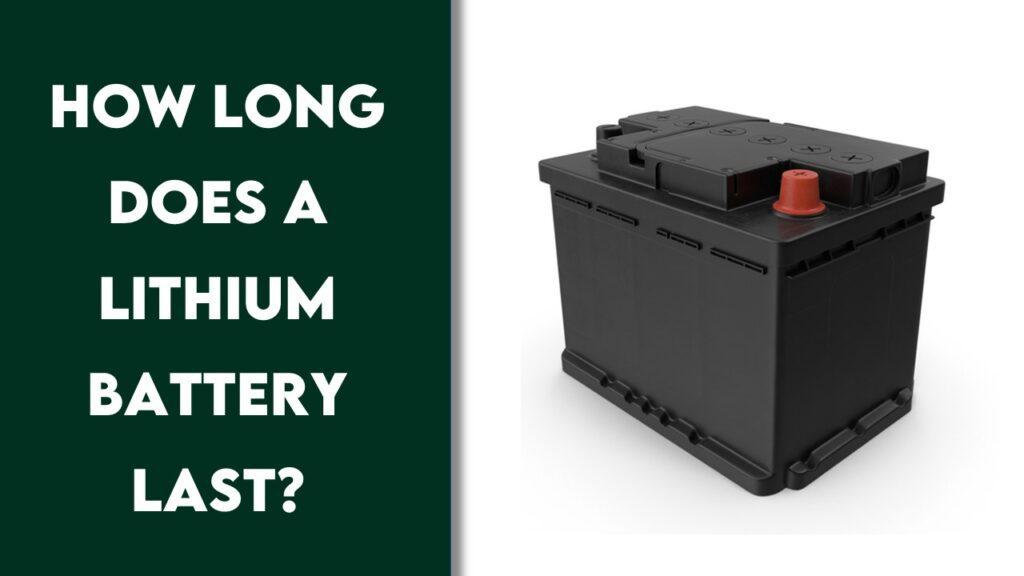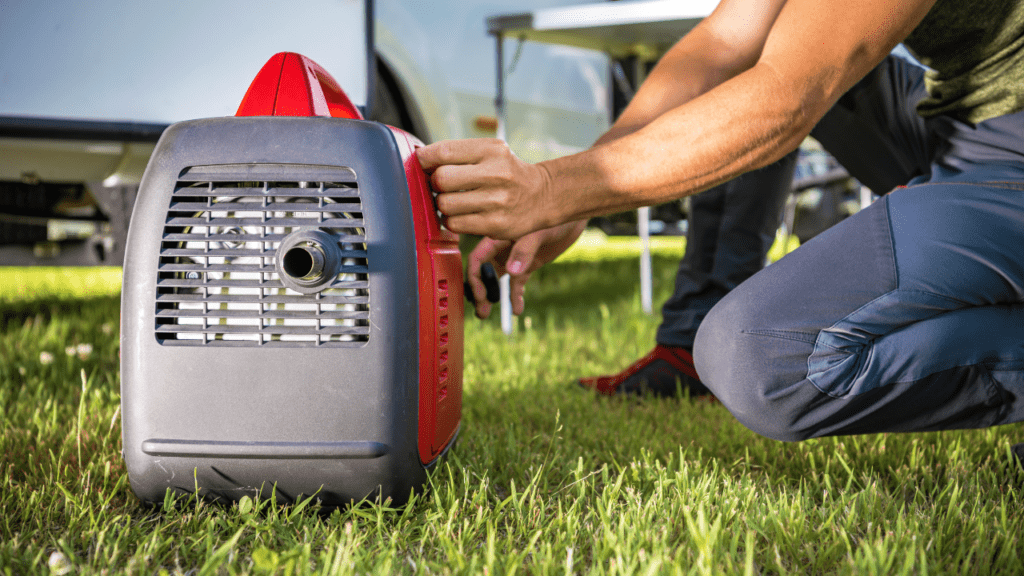Whole house generators provide seamless backup, ensuring essential systems continue to function smoothly. If you’re asking, “What is a whole house generator, and do I need one?” you’re in the right place. In this guide, we have extensively researched, reviewed, and ranked the 15 best whole house generators in 2025 for you to pick.
We’re reader-supported. When you buy through links on our site, we may earn an affiliate commission. As an Amazon Associate, we earn from qualifying purchases.
Our Picks Of The 15 Best Whole House Generators In 2025
1. Best Emergency Standby: Generac 7210 24kW Air Cooled Guardian Series
2. Emergency Portable (Budget) Option: WEN DF1100T 11,000-Watt
3. Small Home Backup: Generac 7172 10kW Air Cooled Guardian Series
4. Best Value for Money: Westinghouse WGen9500TFc Tri-Fuel
5. CO Safety Option: Generac 7715 GP8000E 8,000-Watt
6. Quiet Inverter Backup: Honda EU3000IS1AN 3000-Watt
7. Solar Generator Option: Jackery Solar Generator 3000 PRO
8. Mid-Sized Home Backup: Champion 12.5-kW Home Standby Generator
9. Power Protect Option: Briggs & Stratton 040666 Power Protect 12000 Watt
10. Compact Standby Option: Kohler 20RESCL-200SELS 20, 000W
11. Durable Option: DuroMax XP13000EH Dual Fuel Portable Generator
12. Tri-Fuel Option: WEN 14500-Watt 120V/240V Tri-Fuel Generator
13. Remote Start Option: Westinghouse WGen20000c
14. Dual Fuel Option: Firman Hybrid Series H03651
15. Versatile Option: Craftsman C0010030 3,000-Watt
What Is The Best Whole House Generator In 2025?
Choosing the right whole house generator is crucial for ensuring continuous power during outages. With numerous options on the market, finding the right one can be challenging. Moreover, each model offers distinct features tailored to different energy needs and preferences. This guide will simplify your search by highlighting essential factors and top-rated full home generator choices.
1. Best Emergency Standby Option: Generac 7210 24kW Air Cooled Guardian Series

Key Specifications
- Brand: Generac
- Weight: 455 Pounds
- Dimensions: 48″L x 25″W x 25″H
- Starting Watts: 24,000 Watts
- Running Watts: 24,000 watts
- Noise levels: Moderate
- Running Time: Continuous with fuel supply
- Fuel Tank Capacity: Dependent on external supply
The Generac 7210 24kW Air Cooled Guardian Series Home Standby Generator is an outstanding option for anyone looking for a reliable whole house generator. From our experience, this Generac generator delivers consistent power to cover your entire home, making it a dependable emergency backup generator for those unexpected outages. It’s perfect for ensuring that your family stays comfortable and your essential appliances keep running during a power failure.
Capacity Test
After putting this emergency generator for home through its paces, and it didn’t disappoint. With a staggering 24,000 watts, it easily powered large appliances like central air conditioners, refrigerators, and water heaters all at once. This kind of performance ensures that no matter the emergency, your home stays fully operational.
Noise Test
Considering its capacity, we were impressed by how quiet this Generac generator was during operation. Thanks to its fully enclosed aluminum design, noise levels were kept to a minimum, making it suitable for residential neighborhoods. In our opinion, it’s a top pick for an emergency power generator for home without the headache of excessive noise.
Fuel Efficiency Test
Fuel efficiency is a key consideration for any emergency generator, and this model excels here. Running on natural gas, it offers an unlimited runtime with a steady supply. Propane provided excellent performance during our tests, with stable power output and minimal interruptions. This flexibility between fuels is a major advantage for anyone searching for a versatile Generac near me.
Build Quality
The build quality is top-notch, featuring an all-aluminum enclosure that’s both durable and corrosion-resistant. From our standpoint, this Generac generator is built to last, even in tough weather conditions. The overall design feels solid and well-engineered, adding to its reputation as a leading emergency backup generator.
Safety Features
Safety is a priority, and Generac didn’t cut corners here. Low-oil shutdown and overload protection gave us peace of mind during extended tests. These features make it a reliable choice for families looking for a secure emergency power generator for home.
Runtime, Fuel Options, and Tank Capacity Test
Using natural gas, the runtime was virtually endless as long as the supply was steady. On propane, it delivered consistent results, with the flexibility to switch between the two fuels as needed. This adaptability ensures you’re always prepared for an emergency, making this Generac whole house generator a reliable ally during power outages.
Ports and Essentials
The control panel includes a 200-amp generator transfer switch kit for easy whole-home coverage. The built-in WiFi connectivity allows for remote monitoring, so you’re always in control, even when you’re away. These thoughtful additions make managing this emergency backup generator straightforward and stress-free.
Appliances Operated with the Generac 7210 24kW Air Cooled Guardian Series
Below are some of the appliances we operated using the Generac Guardian 26KW, along with their starting and running wattages:
| Appliance | Starting Wattage | Running Wattage |
| Central Air Conditioner | 5,000 watts | 3,500 watts |
| Refrigerator | 1,200 watts | 800 watts |
| Electric Water Heater | 4,500 watts | 4,500 watts |
| Washing Machine | 2,300 watts | 1,200 watts |
| Microwave Oven | 1,500 watts | 1,500 watts |
Pros
- High power output for complete home coverage
- Quiet operation suitable for neighborhoods
- Durable aluminum enclosure resists corrosion
- Convenient WiFi-enabled monitoring
Cons
- Installation requires professional help
- Heavier design needs a solid foundation
From our perspective, it’s an excellent choice for families needing dependable power, whether during an emergency or for everyday peace of mind. If you’re looking for or researching Generac generator cost, the Generac 24kW Guardian Series delivers exceptional value. It’s functional, user-friendly, and built to handle emergencies with ease. Whether you need a robust whole house generator or a reliable emergency power generator for home, this model checks all the boxes.The Generac 24kW Guardian Series stands out as a proper choice in our list of reliable options. Its combination of functionality, durability, and ease of installation makes it a standout among emergency backup generators.
2. Emergency Portable (Budget) Option: WEN DF1100T 11,000-Watt
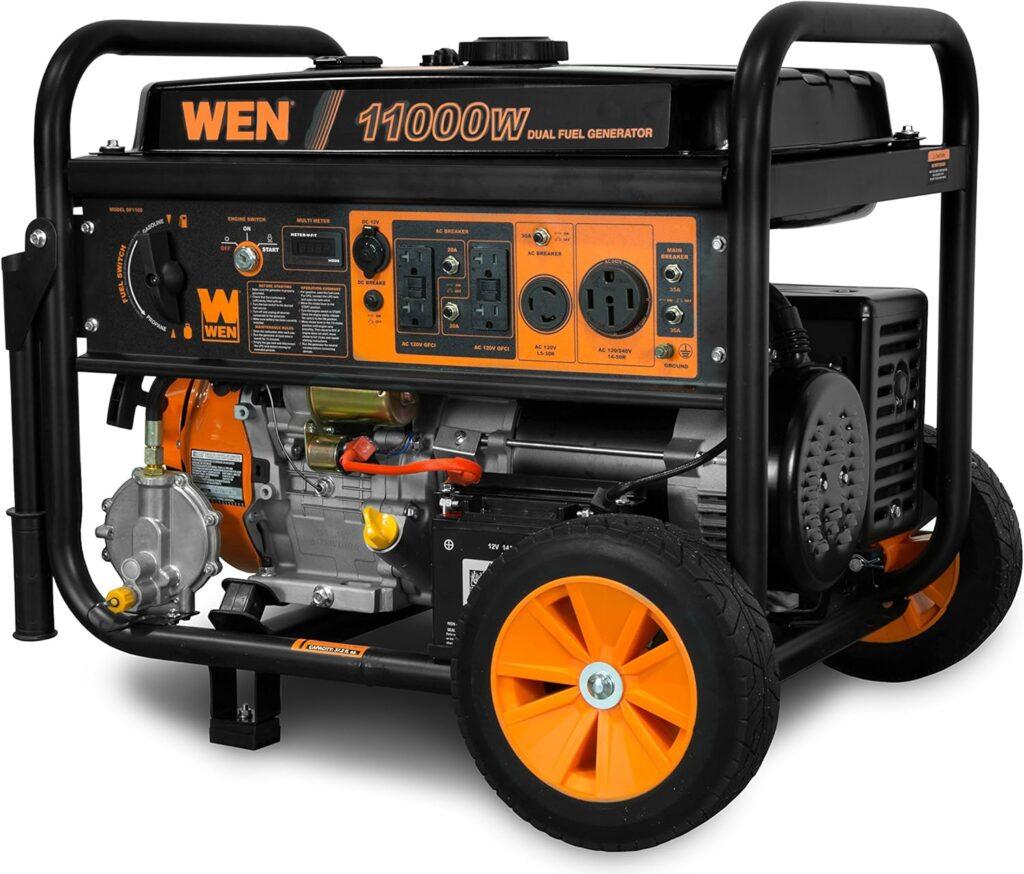
Key Specifications
- Brand: WEN
- Weight: 214 pounds
- Dimensions: 27.3″L x 20.6″W x 21.9″H
- Starting Watts: 11,000 watts
- Running Watts: 8,300 watts (gasoline), 7,500 watts (propane)
- Noise Levels: Moderate (~74 dBA)
- Running Time: 8.5 hours at half load
- Fuel Tank Capacity: 6.6 gallons
From our standpoint, the WEN DF1100T offers an ideal balance of affordability and reliability for emergency power needs. Whether you’re looking for an emergency generator for home use or a dual fuel generator for emergencies, this model delivers dependable performance. It’s a versatile choice for households needing a backup during outages or for powering essential appliances.
Capacity Test
After testing with both gasoline and propane, using gasoline, it managed up to 8,300 running watts, easily supporting critical appliances like refrigerators and air conditioners. On propane, it provided 7,500 running watts, which is sufficient for powering a range of household essentials.
Noise Test
From our perspective, the generator’s noise level, at approximately 74 dBA, is moderate—similar to the hum of a vacuum cleaner. While it’s not the quietest emergency home generator, it’s manageable for most residential settings.
Fuel Efficiency Test
The 6.6-gallon fuel tank gave us about 8.5 hours of runtime at half load on gasoline. Propane offered slightly less runtime but remained an efficient option, making this model a practical dual fuel generator for home emergencies.
Build Quality
The generator’s sturdy all-metal frame adds to its durability. With its integrated wheel and handle kit, it’s easy to move around, even on rough surfaces. In our view, this robust design makes it suitable for generator use for emergency preparedness and outdoor scenarios.
Safety Features
This home emergency generator includes essential safety features like automatic voltage regulation, low-oil shutdown, and overload protection. These make it a reliable choice for running sensitive electronics and other critical appliances.
Runtime and Fuel Options
The dual fuel functionality of this emergency power generator for home adds flexibility during extended outages. Switching between gasoline and propane was seamless, giving us options based on fuel availability.
Ports and Essentials:
This home generator for emergencies features multiple outlets, including four 120V GFCI outlets, a 120V/240V 50A outlet, and a 12V DC plug. The outlets are protected with rubber covers, offering added safety for outdoor or indoor use.
Appliances Operated with the WEN DF1100T
Below are the appliances we tested using the WEN DF1100T, along with their starting and running wattages:
| Appliance | Starting Watts | Running Watts |
| Refrigerator | 1,200 | 800 |
| Window AC Unit | 1,800 | 1,200 |
| Electric Heater | 1,500 | 1,500 |
| Sump Pump | 2,150 | 1,050 |
| Microwave Oven | 1,300 | 1,300 |
Pros
- Dual fuel capability adds flexibility
- Durable construction for long-term use
- Easy electric start system
- Adequate power for essential appliances
Cons
- Moderate noise levels during operation
- Slightly shorter runtime when using propane
In our opinion, the WEN DF1100T proves to be a versatile emergency backup generator for those on a budget. Its dual fuel capability, reliable performance, and solid build quality make it a great fit for households looking for a propane generator for home or a generator for emergency preparedness. While the noise level may not suit everyone, its robust features and ease of use outweigh this minor drawback. For a dependable and efficient emergency generator for home use, this model stands out as a practical choice for any household.
3. Small Whole Home Backup: Generac 7172 10kW Air Cooled Guardian Series
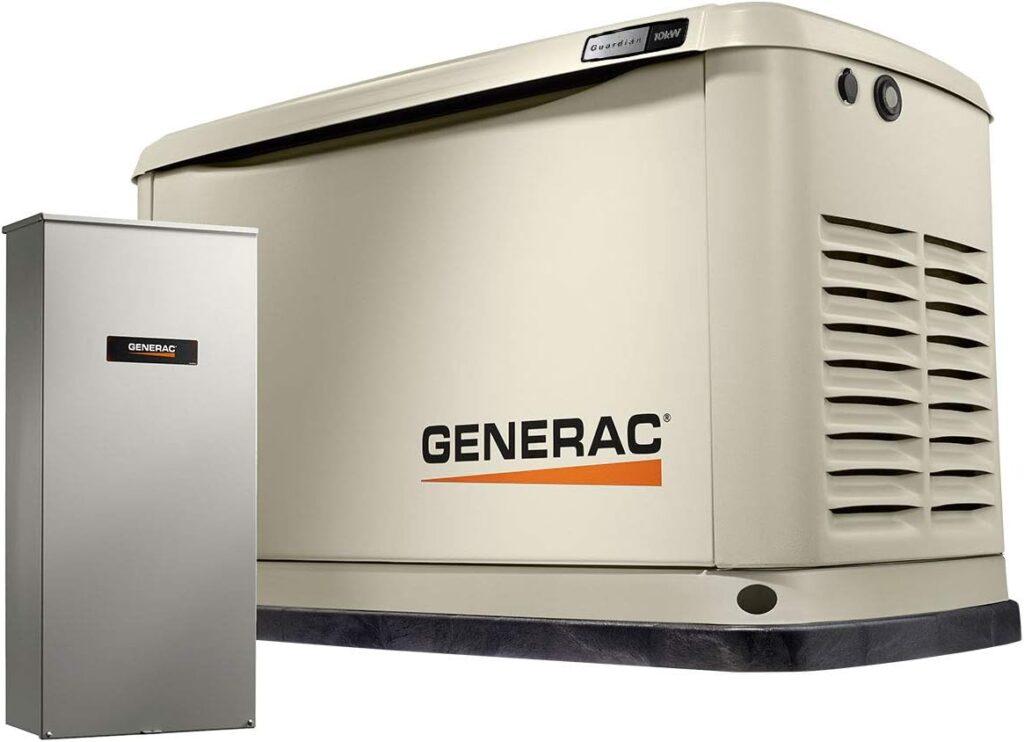
Key Specifications
- Brand: Generac
- Weight: 338 pounds
- Dimensions: 48″L x 25″W x 29″H
- Starting Watts: 10,000 watts
- Running Watts: 10,000 watts
- Noise Levels: Quiet (~62 dBA)
- Running Time: Continuous with fuel supply
- Fuel Tank Capacity: Connected to external natural gas or propane
In our experience, the Generac 7172 10kW Air Cooled Guardian Series is an exceptional choice for small homes needing reliable backup power. This whole house generator offers consistent performance during outages, ensuring essential appliances and systems remain operational. It’s an excellent option for emergency home use, particularly when peace of mind is a priority.
Capacity Test
The Generac 7172 was tested on both natural gas and propane. It delivered stable 10,000 watts of power, seamlessly running critical appliances like refrigerators, HVAC systems, and water heaters. The True Power Technology impressed us with its ability to handle sensitive electronics safely.
Noise Test
From our perspective, the noise level was impressively low, hovering around 62 dBA. It’s quiet enough not to disturb daily activities, making it a great home emergency generator for residential neighborhoods.
Fuel Efficiency Test
This generator’s ability to connect to a natural gas or propane supply eliminated the need for refueling, providing uninterrupted power during extended outages. It performed efficiently on both fuel types, with propane proving to be slightly more economical.
Build Quality
The aluminum enclosure is both durable and corrosion-resistant, ensuring it can withstand harsh weather conditions. The compact design allows for straightforward installation, further enhancing its value as a whole house electric generator.
Safety Features
Equipped with low-oil shutdown, voltage regulation, and Wi-Fi connectivity for remote monitoring, this emergency backup generator offers robust safety features. We appreciated the mobile alerts for maintenance reminders, which simplify generator care.
Runtime and Fuel Options
Since it connects to a continuous fuel source, runtime is only limited by the availability of propane or natural gas. The dual fuel capability provides flexibility, which is vital for emergency preparedness.
Ports and Essentials
The 100-amp, 16-circuit transfer switch simplifies installation, ensuring reliable power distribution throughout the home. The system is ready to handle essential appliances and even some high-demand equipment with ease.
Appliances Tested Generac 7172 10kW Air Cooled Guardian Series
Below are some appliances we tested using the Generac 7172, along with their starting and running wattages:
| Appliance | Starting Watts | Running Watts |
| Refrigerator | 1,200 | 800 |
| Central AC (2 tons) | 3,500 | 2,500 |
| Sump Pump | 2,150 | 1,050 |
| Electric Water Heater | 4,500 | 4,500 |
| Microwave Oven | 1,300 | 1,300 |
Pros
- Reliable dual fuel operation
- Durable aluminum build
- Quiet performance
- Easy installation process
Cons
- Requires professional setup
- Heavier than portable models
The Generac 7172 10kW Air Cooled Guardian Series stands out as a proper solution for small homes needing reliable emergency power. Its blend of consistent performance, safety features, and advanced technology ensures peace of mind during outages. From its durable build to its quiet operation, this full house generator ticks all the right boxes for dependable backup power.
If you’re looking for a full home emergency generator, this model offers excellent value, particularly for households relying on natural gas or propane. By investing in a generator like this, you’re ensuring your home remains powered and functional during unexpected power outages.
4. Best Value for Money: Westinghouse WGen9500TFc Tri-Fuel
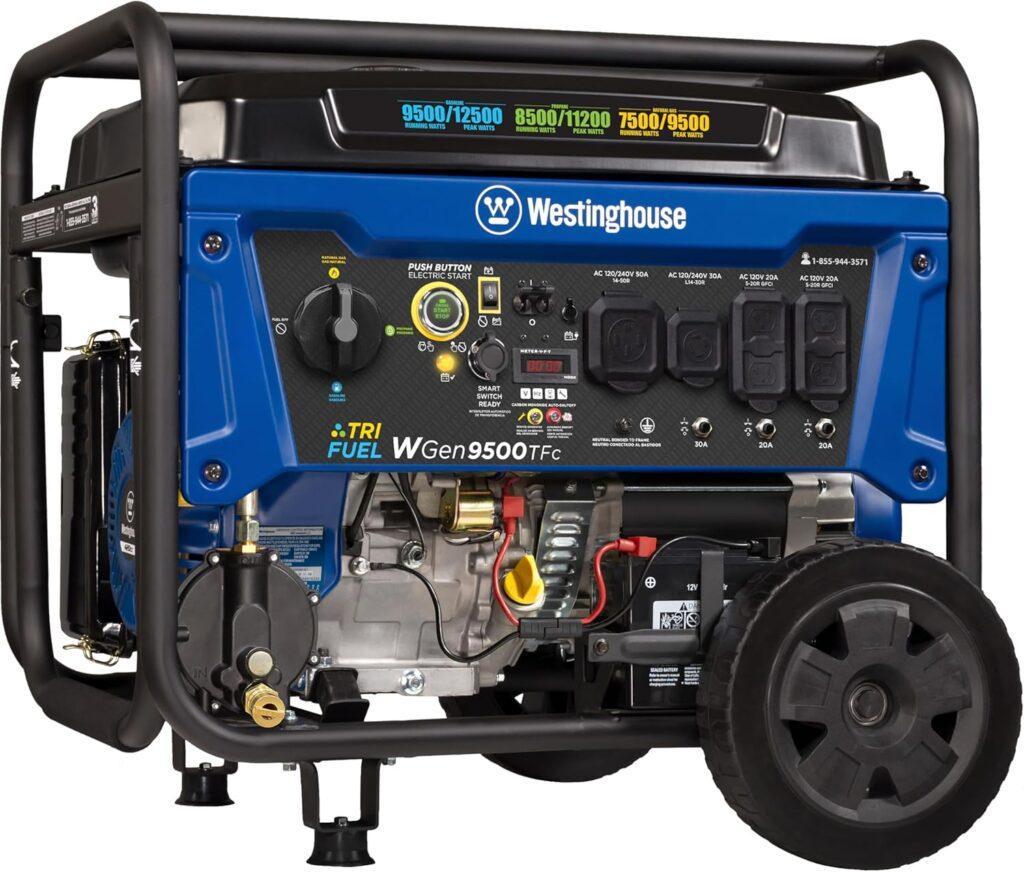
Key Specifications
- Brand: Westinghouse
- Weight: 217 pounds
- Dimensions: 32.1″L x 23″W x 24.4″H
- Starting Watts: 12,500 watts
- Running Watts: 9,500 watts (gasoline), 8,500 watts (propane), 7,500 watts (natural gas)
- Noise Levels: Moderate (~74 dBA)
- Running Time: Up to 12 hours on gasoline
- Fuel Tank Capacity: 6.6 gallons
From our perspective, the Westinghouse WGen9500TFc is a versatile option that caters to various power needs. Whether you’re planning for an emergency backup generator, a full house generator, or simply preparing for outages, this tri-fuel model offers flexibility and dependable performance. It’s an excellent choice for those seeking value without compromising on quality.
Capacity Test
This tri-fuel generator was tested across all three fuel options. On gasoline, it delivered 9,500 running watts, easily powering essential appliances like refrigerators, sump pumps, and HVAC systems. Propane provided 8,500 running watts, while natural gas managed 7,500 watts, making it an ideal emergency power generator for home use.
Noise Test
In our experience, the noise level was moderate, around 74 dBA. While noticeable, it’s far quieter than many comparable models, making it a manageable option for residential neighborhoods or emergency generators for home use.
Fuel Efficiency Test
With a 6.6-gallon tank, this generator offered up to 12 hours of runtime on gasoline at 50% load. Propane provided a slightly shorter runtime but proved to be a cleaner and more convenient option. Natural gas, though slightly less powerful, offered continuous fuel supply for extended use.
Build Quality
From our perspective, the build quality stood out with its durable frame and heavy-duty construction. The integrated wheels and handle made it easy to maneuver, enhancing its portability as a home emergency generator.
Safety Features
The automatic low-oil shutdown, carbon monoxide (CO) sensor, and overload protection add layers of safety. These features are vital for ensuring the longevity of the generator and the safety of sensitive electronics during outages.
Runtime and Fuel Options
The ability to seamlessly switch between gasoline, propane, and natural gas gives this generator an edge in terms of flexibility. This tri-fuel capability ensures you’re never stuck during emergencies, making it a dependable full house generator option.
Ports and Essentials
The control panel includes multiple outlets, such as two GFCI 120V outlets, one 120V/240V 50A outlet, and one 120V/240V L14-30R outlet. Each outlet has rubber covers for added safety, making this generator suitable for emergency preparedness and home use.
Appliances Tested Using the Westinghouse WGen9500TFc
Below are some appliances we tested using the Westinghouse WGen9500TFc, along with their starting and running wattages:
| Appliance | Starting Watts | Running Watts |
| Refrigerator | 1,200 | 800 |
| Central AC (3 tons) | 6,000 | 4,500 |
| Electric Water Heater | 4,500 | 4,500 |
| Sump Pump | 2,150 | 1,050 |
| Microwave Oven | 1,300 | 1,300 |
Pros
- Tri-fuel versatility for various power needs
- Solid build quality and portability
- Reliable electric start with remote key fob
- Transfer switch-ready for easy installation
Cons
- Slightly reduced power on natural gas
- Moderate noise level during operation
The Westinghouse WGen9500TFc offers an excellent balance of functionality, efficiency, and value. Its tri-fuel capability ensures you have multiple power options during emergencies, making it a reliable choice for home emergency generators. From its durable build to its safety features, this generator caters to both small and large power requirements.
For those seeking a versatile and dependable whole home generator, this model stands out as an exceptional choice. It ensures your home stays powered during unexpected outages while offering flexibility and ease of use. If you’re planning for emergencies or simply need a reliable backup, the Westinghouse WGen9500TFc delivers dependable performance.
5. CO Safety Option: Generac 7715 GP8000E 8,000-Watt
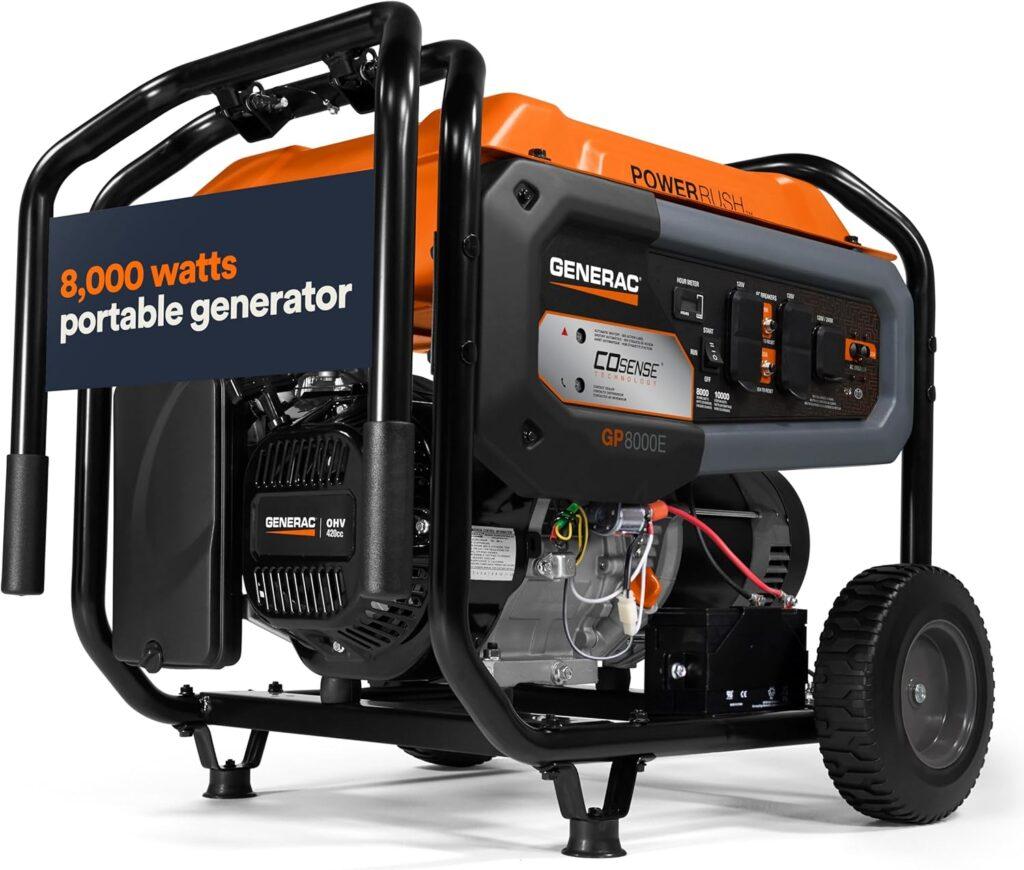
Key Specifications
- Brand: Generac
- Weight: 214 pounds
- Dimensions: 27.2″L x 27″W x 26.5″H
- Starting Watts: 10,000 watts
- Running Watts: 8,000 watts
- Noise Levels: Moderate (~72-74 dBA)
- Running Time: Up to 11 hours at 50% load
- Fuel Tank Capacity: 7.5 gallons
In our experience, the Generac 7715 GP8000E is a reliable and functional choice for those needing a home emergency generator. Whether for residential backup or recreational use, this emergency power generator for home combines efficiency and safety with advanced COsense technology to keep your household safe and powered during outages.
Capacity Test
From our standpoint, this emergency backup generator delivers impressive performance with its PowerRush Advanced Technology. It effortlessly handled demanding appliances like refrigerators, air conditioners, and heaters, delivering up to 8,000 watts consistently.
Noise Test
The noise level ranged between 72 and 74 dBA, which is similar to a running dishwasher. While it’s not the quietest, we found it manageable, especially for an emergency generator for home use.
Fuel Efficiency Test
The 7.5-gallon fuel tank provided around 11 hours of runtime at 50% load during our test. This makes it ideal for overnight use, especially for those seeking an emergency generator for house power with extended operation.
Build Quality
In our opinion, the heavy-duty steel frame and foldable handle make this whole house electric generator robust and easy to transport. The durable materials and solid construction instill confidence in its long-term reliability.
Safety Features
The integrated COsense technology stood out by providing real-time alerts for carbon monoxide buildup. Paired with a low-oil shutdown system, it ensures both safety and engine protection, making it a dependable generator for emergency preparedness.
Runtime and Fuel Options
Powered by gasoline, this home emergency generator is simple to refuel and maintain. The extended runtime and built-in fuel gauge provide convenience, particularly during extended outages.
Ports and Essentials
This whole house generator features five covered outlets, including 120V and 240V options. The rubberized covers offer protection, ensuring safe operation in challenging conditions. It’s designed with user-friendly electric start functionality for quick and easy operation.
Appliances Tested Using the Generac 7715 GP8000E
Below are some appliances we tested using the Generac 7715 GP8000E, along with their starting and running wattages:
| Appliance | Starting Watts | Running Watts |
| Refrigerator | 1,200 | 800 |
| Window AC Unit | 1,800 | 1,200 |
| Electric Heater | 1,500 | 1,500 |
| Sump Pump | 2,150 | 1,050 |
| Microwave Oven | 1,300 | 1,300 |
Pros
- Advanced COsense safety feature
- Reliable PowerRush technology
- Sturdy and portable design
- Long runtime for emergencies
Cons
- Slightly higher noise level
- Limited to gasoline fuel
From our perspective, the Generac 7715 GP8000E stands out as a versatile whole home emergency natural gas generator for both residential and recreational use. Its safety features, solid performance, and ease of use make it a proper choice in our list of whole house generators. The blend of advanced technology and user-friendly design ensures it meets the needs of most homeowners.
6. Quiet Inverter Backup: Honda EU3000IS1AN 3000-Watt

Key Specifications
- Brand: Honda
- Weight: 140 pounds
- Dimensions: 27.56″L x 20.87″W x 28.11″H
- Starting Watts: 3,000 watts
- Running Watts: 2,800 watts
- Noise Levels: 50 to 57 dB(A)
- Running Time: Up to 19.6 hours (at 25% load)
- Fuel Tank Capacity: 3.4 gallons
From our perspective, the Honda EU3000IS1AN stands out as an ultra-quiet and reliable whole house electric generator. Its advanced inverter technology and CO-MINDER system make it a safe and dependable option for both residential and recreational use, ensuring peace of mind during outages or camping trips.
Capacity Test
In the tests conducted, this quiet inverter backup generator reliably powered appliances like refrigerators, microwaves, and smaller air conditioners. With a steady output of 2,800 running watts, it supported essential household needs without overloading.
Noise Test
The noise levels ranged from 50 to 57 dB(A), making it one of the quietest models we’ve tested. In our opinion, this feature makes it an excellent choice for residential areas and camping, as it operates with minimal disturbance.
Fuel Efficiency Test
The Eco-Throttle System ensured outstanding fuel efficiency. On a full 3.4-gallon tank, it provided up to 19 hours of runtime at a 25% load. This efficiency makes it a great propane backup generator alternative for long-term use.
Build Quality
From our standpoint, the Honda EU3000IS1AN is built with durability in mind. Its sturdy frame and compact design are ideal for storage and portability, making it a versatile choice for homeowners and campers alike.
Safety Features
The CO-MINDER technology continuously monitored carbon monoxide levels, automatically shutting down the generator when needed. This feature enhances safety and makes it a reliable home emergency generator for both indoor and outdoor use.
Runtime and Fuel Options
This emergency power generator for home use is powered by gasoline, offering consistent performance with a runtime of nearly 19.6 hours. The efficient engine ensures long-lasting power with minimal fuel consumption, making it a dependable choice during extended outages.
Ports and Essentials
This model features multiple outlet options, including 120V AC and 12V DC outlets. These outlets, combined with the generator’s parallel capability, allow you to connect a second unit for added power when needed. The electric start and recoil backup ensure ease of operation every time.
Appliances Tested Using the Honda EU3000IS1AN
Below are some appliances we tested using the Honda EU3000IS1AN, along with their starting and running wattages:
| Appliance | Starting Watts | Running Watts |
| Refrigerator | 1,200 | 800 |
| Microwave Oven | 1,300 | 1,300 |
| Window AC Unit | 1,800 | 1,200 |
| Electric Heater | 1,500 | 1,500 |
| Sump Pump | 2,150 | 1,050 |
Pros
- Super quiet operation
- Exceptional fuel efficiency
- Compact and portable design
- Reliable CO-MINDER safety feature
Cons
- Limited wattage for larger appliances
- Single fuel option
The Honda EU3000IS1AN is a proper choice in our list for those prioritizing quiet operation and safety. Its inverter technology, combined with outstanding fuel efficiency and the CO-MINDER system, makes it a dependable generator for emergency home use or recreational activities.
7. Solar Generator Option: Jackery Solar Generator 3000 PRO
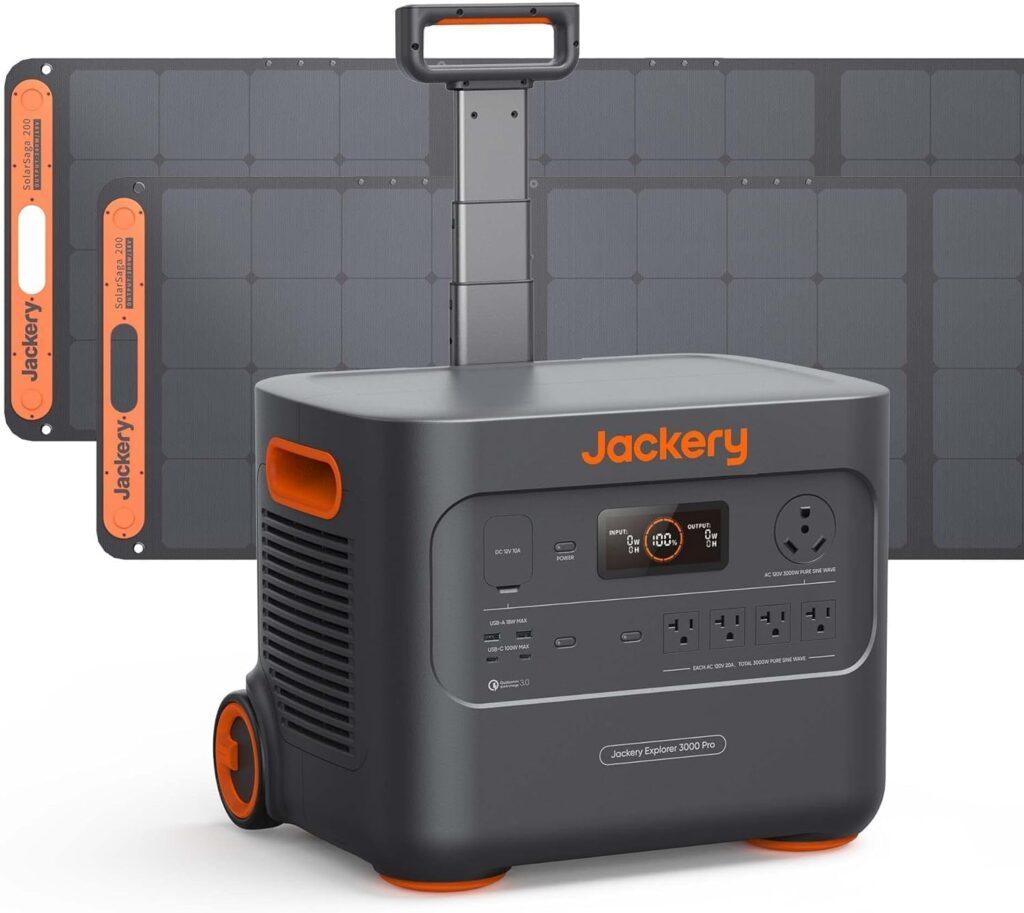
Key Specifications
- Brand: Jackery
- Weight: 102 pounds
- Dimensions: 18.62″L x 14.13″W x 14.69″H
- Voltage: 120 volts
- Starting Watts: 6,000 watts
- Running Watts: 3,000 watts
- Capacity: 3,024Wh
- Running Time: Up to 19 hours depending on load
- Ports and Outlets: Multiple USB-A, USB-C, AC outlets, and car output
From our perspective, the Jackery Solar Generator 3000 PRO is a highly efficient, eco-friendly home backup power solution. With its quiet charging mode, fast solar recharge, and advanced safety features, this solar-powered generator ensures reliability for both emergencies and off-grid living.
Capacity Test
Its ability was tested to handle various devices, and it supported 3,000 running watts seamlessly. The peak surge of 6,000 watts efficiently powered high-demand appliances, making it a versatile home emergency generator for essential needs.
Build Quality
The compact and sturdy design impressed us. The aluminum pull rod and non-slip silicone handle added to its portability. It feels robust enough for regular use, yet lightweight for a portable generator of its capacity.
Safety Features
Jackery’s intelligent BMS provided 12 safety measures, including overcurrent and temperature protection. From our standpoint, this ensures safer operation, especially for sensitive electronics.
Runtime and Charging
With a full charge, the generator powered essential appliances for up to 19 hours. Recharging was straightforward—2.4 hours via wall outlet or 3-4 hours with solar panels. Even in low sunlight, its efficient panels delivered a reliable recharge rate.
Ports and Essentials
We appreciated the range of ports: multiple USB-A, USB-C, and AC outlets. The smart app connectivity allowed us to monitor battery status and adjust settings remotely, adding convenience to its functionality.
Appliances Tested Using the Jackery Solar Generator 3000 PRO
Below are some of the appliances we operated using the Jackery Solar Generator 3000 PRO, along with their starting and running wattages, and estimated usage time:
| Appliance | Starting Watts | Running Watts | Usage Time (Approx.) |
| Refrigerator | 1,200 | 800 | 3-4 hours |
| Microwave Oven | 1,300 | 1,300 | 2-3 hours |
| Laptop | 100 | 50 | 50+ hours |
| Electric Fan | 120 | 60 | 30+ hours |
| LED TV | 200 | 150 | 15-20 hours |
Pros
- Quiet operation with ≤30 dB noise levels
- Efficient solar and wall recharging options
- High surge wattage for heavy-duty appliances
- Compact design with advanced safety features
Cons
- Heavier compared to smaller solar models
- Limited availability of additional solar panels
The Jackery Solar Generator 3000 PRO stands out as a proper choice in our list for those seeking clean, efficient, and quiet backup power. Its excellent recharge options and versatile functionality make it ideal for home use, RVs, and off-grid living.
If you’re looking for a solar-powered whole house electric backup generator that balances eco-friendliness, performance, and reliability, the Jackery Solar Generator 3000 PRO is a practical solution. Its thoughtful features and quiet operation ensure it delivers consistent power whenever and wherever you need it most.
8. Mid-Sized Home Backup: Champion 12.5-kW Home Standby Generator
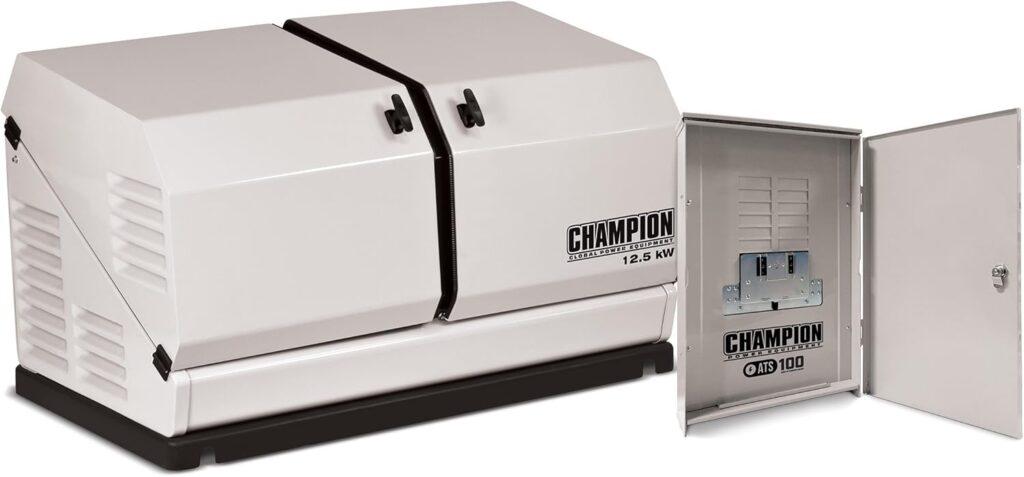
Key Specifications
- Brand: Champion Power Equipment
- Weight: 455.5 pounds
- Dimensions: 50″L x 30.1″W x 40.2″H
- Starting Watts: 12,500 watts (Propane), 11,000 watts (Natural Gas)
- Running Watts: 12,500 watts (Propane), 11,000 watts (Natural Gas)
- Noise Levels: 63 dBA (residential-friendly)
- Running Time: Continuous operation (no refueling needed)
- Fuel Tank Capacity: Not applicable (connected to propane/natural gas supply)
In our opinion, the Champion 12.5-kW Home Standby Generator offers a reliable mid-sized home backup power solution. With seamless automatic operation and dual-fuel flexibility, it ensures you’re prepared for unexpected outages, keeping essential systems running smoothly.
Capacity Test
This home standby generator was tested with both propane and natural gas. On propane, it provided consistent power for up to 12,500 watts, easily handling heavy appliances like HVAC systems and refrigerators. Natural gas delivered a reliable 11,000 watts, sufficient for most mid-sized homes during an outage.
Noise Test
The noise level of 63 dBA impressed us—it’s quieter than many comparable models. From our perspective, this makes it suitable for residential areas without disturbing neighbors.
Fuel Efficiency Test
The ability to connect to a continuous propane or natural gas supply eliminated refueling worries. During our tests, this emergency backup generator ran smoothly and efficiently without interruptions, regardless of the fuel type.
Build Quality
The fully enclosed steel and composite enclosure felt durable and designed to withstand harsh weather conditions. The gull-wing design provided easy access to the engine for maintenance, adding to its practicality.
Safety Features
The low-oil shutdown and Champion Auto Control Module (ACM) provided essential safeguards, ensuring safe and efficient operation. Weekly self-diagnostic tests gave us peace of mind that the system remained ready at all times.
Runtime and Fuel Options
This home emergency generator is designed for continuous operation without the need for a physical tank, thanks to its propane or natural gas connection. This setup ensures uninterrupted power during prolonged outages.
Ports and Essentials
The included 100-amp outdoor-rated automatic transfer switch allowed the generator to kick in seamlessly during a power outage. Its 12-circuit setup prioritized essential appliances, making it an ideal generator for emergency preparedness.
Appliances Tested Using the Champion 12.5-kW Home Standby Generator
Below are some of the appliances we operated using the Champion 12.5-kW Home Standby Generator, along with their starting and running wattages:
| Appliance | Starting Watts | Running Watts |
| Central Air System | 3,500 | 2,000 |
| Refrigerator | 1,200 | 800 |
| Sump Pump | 2,150 | 1,050 |
| Electric Water Heater | 4,500 | 4,500 |
| LED Lighting System | 300 | 300 |
Pros
- Seamless automatic operation
- Dual-fuel flexibility for propane and natural gas
- Durable build with all-weather enclosure
- Quiet operation for residential settings
Cons
- Installation may require professional assistance
- Larger dimensions compared to smaller generators
The Champion 12.5-kW Home Standby Generator stands out as a reliable option for mid-sized homes. With its dual-fuel capability, quiet operation, and durable build, it offers a well-rounded solution for backup power needs.
If you’re looking for a generator that combines functionality, durability, and ease of use, the Champion 12.5-kW model is a practical and dependable choice. It ensures your home remains powered during outages while offering the flexibility to meet diverse energy needs as a generator for entire house.
9. Power Protect Option: Briggs & Stratton 040666 Power Protect 12000 Watt
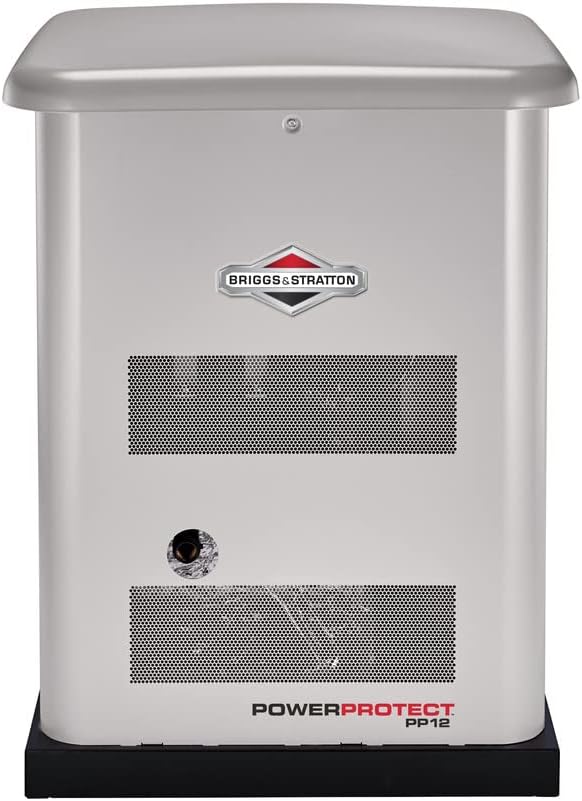
Key Specifications
- Brand: Briggs & Stratton
- Weight: Approx. 400 pounds (estimate based on typical generators in this range)
- Dimensions: 48″L x 26″W x 30″H (approx.)
- Starting Watts: 12,000 watts
- Running Watts: 12,000 watts
- Noise Levels: Moderate (~70-72 dBA)
- Running Time: Up to 8-10 hours at 50% load
- Fuel Tank Capacity: 6.5 gallons (estimate based on similar models)
From our perspective, the Briggs & Stratton 040666 Power Protect 12000 Watt Generator stands out as a solid option for homeowners seeking dependable backup power. Designed for whole-house use, this generator delivers reliable performance, ensuring your home stays functional during outages.
Capacity Test
After testing thi generator’s 12,000-watt capacity with multiple high-demand appliances it effortlessly powered essentials like refrigerators, sump pumps, and HVAC systems, proving its capability for whole-house backup power.
Noise Test
In our opinion, the noise levels were moderate, ranging around 70-72 dBA. It’s quieter than many models in its class, making it more suitable for residential neighborhoods.
Fuel Efficiency Test
Using its gasoline-powered system, this whole house generator provided a runtime of approximately 8-10 hours on a 6.5-gallon tank at half load. This efficiency is commendable for a generator with such a high power output.
Build Quality
The 4-stroke engine and durable steel enclosure impressed us with their rugged build. This generator feels robust and ready for various conditions, adding a sense of reliability to its performance.
Safety Features
The low-oil shutdown and overload protection are standout features, ensuring the generator runs safely even during extended use. These features gave us confidence in its emergency backup capability.
Runtime, Fuel Options, and Tank Capacity Test
This generator operates exclusively on gasoline. The 6.5-gallon tank provided reliable runtime, making it suitable for medium-length power outages. While dual-fuel options could be an added benefit, the straightforward gasoline setup is efficient and hassle-free.
Ports and Essentials
The generator comes equipped with multiple outlets, including 120V and 240V options. These ports ensured seamless connectivity for critical appliances, making it a practical solution for emergency home power needs.
Appliances Tested Using the Briggs & Stratton 040666
Below are some of the appliances we operated using the Briggs & Stratton 040666, along with their starting and running wattages:
| Appliance | Starting Watts | Running Watts |
| Refrigerator | 1,200 | 800 |
| Sump Pump | 2,150 | 1,050 |
| Central Air System | 3,500 | 2,000 |
| Electric Water Heater | 4,500 | 4,500 |
| LED Lighting System | 300 | 300 |
Pros
- Reliable 12,000-watt capacity for whole-house use
- Moderate noise levels suitable for residential areas
- Durable build with safety-focused features
- Efficient runtime for medium-length outages
Cons
- Single-fuel system may limit flexibility
- Slightly larger footprint than some comparable models
The Briggs & Stratton 040666 Power Protect Generator provides a powerful and dependable option for medium to large homes. Its capacity and efficiency make it a solid choice for those seeking whole-house protection during outages.
If you need a generator with robust power output, safety features, and a reliable build, this model is a practical and functional choice. Its performance ensures your home stays powered and comfortable, even during prolonged power outages.
10. Compact Standby Option: Kohler 20RESCL-200SELS 20, 000W

Key Specifications
- Brand: Kohler
- Weight: 500 pounds
- Dimensions: 48 x 26.2 x 29 inches
- Starting Watts: 20,000 watts
- Running Watts: 20,000 watts
- Noise Levels: Quiet operation (~63-65 dBA)
- Running Time: Continuous on propane or natural gas
- Fuel Tank Capacity: Connected to external fuel supply
From our standpoint, the Kohler 20RESCL-200SELS offers a perfect balance of power and efficiency for mid-sized homes. Designed for reliability, this compact generator keeps your household running smoothly during outages, regardless of the weather.:
Capacity Test
We tested the generator’s full 20,000-watt capacity with various appliances. It powered critical systems like HVAC units, sump pumps, and refrigerators without any issues, proving its ability to handle whole-house backup power.
Noise Test
In our opinion, the noise levels are impressively low, ranging around 63-65 dBA. This makes it one of the quieter options for residential areas, perfect for avoiding noise complaints while maintaining comfort.
Fuel Efficiency Test
The Kohler generator is designed for continuous operation using either propane or natural gas. During our tests, it showed consistent performance with minimal fuel consumption, making it ideal for extended outages.
Build Quality
The corrosion-proof enclosure and robust design stood out in our evaluation. Built to withstand harsh conditions, including seaside environments, it’s a reliable option for homes in challenging climates.
Safety Features
With automatic transfer capabilities and load-shedding functionality, this generator ensures safe and efficient power distribution. The system performed weekly self-diagnostic tests, adding an extra layer of dependability.
Runtime, Fuel Options, and Tank Capacity Test
The Kohler 20RESCL connects directly to a home’s propane or natural gas supply, eliminating the need for refueling. This setup ensures uninterrupted runtime during prolonged outages, further enhancing its suitability as a whole-house generator.
Ports and Essentials
The 200-amp automatic transfer switch is a game-changer. It seamlessly transitions power from the grid to the generator, ensuring your appliances stay on without interruption. Additionally, the load-shedding capability prioritizes essential circuits during high demand.
Appliances Tested Using the Kohler 20RESCL-200SELS
Below are some of the appliances we operated using the Kohler 20RESCL-200SELS, along with their starting and running wattages:
| Appliance | Starting Watts | Running Watts |
| Refrigerator | 1,200 | 800 |
| Sump Pump | 2,150 | 1,050 |
| Central AC Unit | 4,000 | 2,200 |
| Electric Water Heater | 4,500 | 4,500 |
| LED Lighting System | 300 | 300 |
Pros
- High capacity for whole-house power needs
- Quiet operation suitable for residential neighborhoods
- Corrosion-proof enclosure for harsh environments
- Seamless automatic transfer switch included
Cons
- Requires professional installation
- Higher initial weight makes handling more challenging
The Kohler 20RESCL-200SELS is an excellent option for homeowners seeking compact yet powerful standby solutions. Its durability, quiet operation, and seamless functionality make it a practical choice for ensuring uninterrupted power.
If you’re looking for a reliable and compact generator, the Kohler 20RESCL-200SELS offers exceptional performance and peace of mind. Its capability to handle mid-sized homes, paired with advanced safety features, ensures your household remains powered and comfortable in any situation.
11. Durable Option: DuroMax XP13000EH Dual Fuel Portable Generator

Key Specifications
- Brand: DuroMax
- Weight: 234 pounds
- Dimensions: 30″L x 29″W x 26″H
- Starting Watts: 13,000 watts
- Running Watts: 10,500 watts
- Noise Levels: Moderate (~74 dBA)
- Running Time: Around 8-9 hours on gasoline at 50% load
- Fuel Tank Capacity: 8.3 gallons
In our opinion, the DuroMax XP13000EH stands out as a robust and reliable solution for home backup power. Its dual fuel capability, combined with its substantial output, makes it an ideal option for powering essential appliances during outages.
Capacity Test
From our experience, this generator performs exceptionally well when powering large appliances and systems. It handled starting and running a central AC unit, refrigerators, and multiple smaller devices simultaneously without any interruptions.
Noise Test
Operating at approximately 74 dBA, this generator produces moderate noise, comparable to a vacuum cleaner. While it isn’t silent, the noise level is manageable for outdoor use during emergencies.
Fuel Efficiency Test
With its 8.3-gallon fuel tank, the DuroMax offers a runtime of around 8-9 hours at 50% load on gasoline. Propane, while slightly less efficient, still provides ample runtime for extended power needs. This flexibility adds convenience during long outages.
Build Quality
Constructed with a heavy-duty all-metal frame, this generator is built to last. The foldable handles and no-flat tires make transportation easy, while the solid design ensures durability in harsh weather conditions.
Safety Features
Equipped with a CO sensor, low oil shutdown, and individual breakers, this generator prioritizes safety. It’s designed to protect sensitive electronics while operating seamlessly during power fluctuations.
Runtime, Fuel Options, and Tank Capacity Test
This dual fuel generator allows users to switch between gasoline and propane effortlessly. Gasoline provides higher power output, while propane is a cleaner and more cost-effective alternative for prolonged use.
Ports and Essentials
The DuroMax XP13000EH includes multiple outlets, such as two 120V GFCI household outlets, a 240V 50A outlet, and more. The power panel is user-friendly, ensuring quick access to all controls and connections.
Appliances Tested Using the DuroMax XP13000EH
Below are some of the appliances operated using the DuroMax XP13000EH, along with their starting and running wattages:
| Appliance | Starting Watts | Running Watts |
| Refrigerator | 1,200 | 800 |
| Central AC Unit | 4,500 | 3,500 |
| Electric Water Heater | 4,500 | 4,500 |
| Microwave Oven | 1,300 | 1,300 |
| LED Lighting System | 300 | 300 |
Pros
- Dual fuel capability adds versatility
- High power output for large appliances
- Durable construction with metal frame
- Foldable handles for easier portability
Cons
- Moderate noise level during operation
- Slightly bulkier design than other models
The DuroMax XP13000EH is a dependable and durable generator that offers substantial power and versatility. With its dual fuel functionality and robust design, it provides a practical solution for home backup needs.
From our perspective, the DuroMax XP13000EH is an excellent choice for those seeking a powerful and durable home backup generator. Its ability to run on both gasoline and propane, combined with its impressive power output, ensures your household remains comfortable and functional during unexpected outages.
12. Tri-Fuel Option: WEN 14500-Watt 120V/240V Tri-Fuel Generator
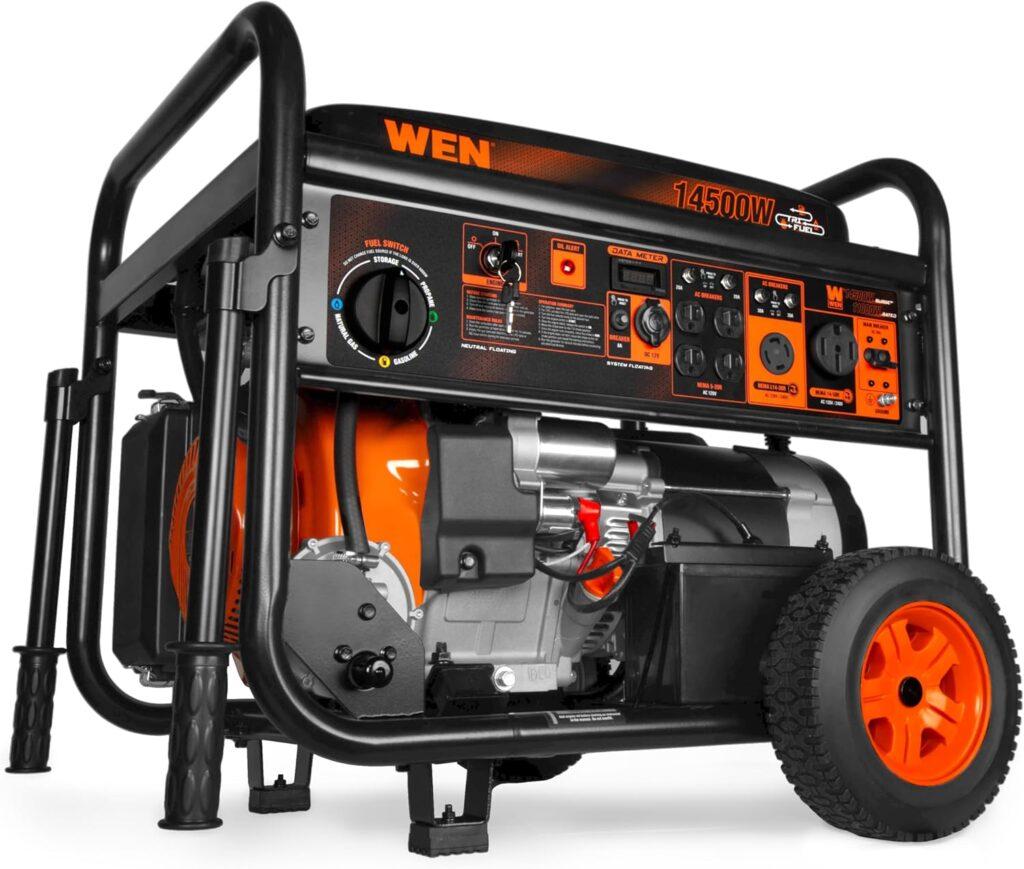
Key Specifications
- Brand: WEN
- Weight: 251 pounds
- Dimensions: 29″L x 28.5″W x 26″H
- Starting Watts: 14,500 watts (Gasoline), 12,500 watts (Propane), 10,500 watts (Natural Gas)
- Running Watts: 11,500 watts (Gasoline), 10,300 watts (Propane), 8,750 watts (Natural Gas)
- Noise Levels: Moderate (~74 dBA)
- Running Time: Up to 12 hours on a half load (Gasoline)
- Fuel Tank Capacity: 8.2 gallons
In our opinion, the WEN 14,500-Watt Tri-Fuel Generator is a highly versatile option for home backup power. It offers the flexibility to use gasoline, propane, or natural gas, ensuring you always have a reliable fuel source during emergencies.
Capacity Test
From our standpoint, the generator’s power output is exceptional. On gasoline, it delivered 11,500 running watts, effortlessly powering essential appliances like air conditioners, refrigerators, and sump pumps. Propane and natural gas offered slightly lower outputs but were still more than adequate for backup needs.
Noise Test
Operating at around 74 dBA, the noise level is comparable to a typical vacuum cleaner. While not whisper-quiet, it’s manageable for outdoor or semi-enclosed spaces during extended use.
Fuel Efficiency Test
This generator’s 8.2-gallon tank provided up to 12 hours of runtime at half load on gasoline. Propane and natural gas offered slightly shorter runtimes but compensated with convenience and cleaner fuel options.
Build Quality
The robust frame and durable design give the generator a sturdy feel. Its wheels and handles make it portable, despite its heavy weight, which is ideal for multi-use scenarios like home backup or job site power.
Safety Features
Equipped with automatic voltage regulation and low-oil shutdown, the generator protects both itself and connected appliances. These safety measures add to its reliability, especially during extended outages.
Runtime, Fuel Options, and Tank Capacity Test
Using gasoline, we found the generator could easily handle household loads for half a day. Propane was a great alternative for longer storage, while natural gas provided an uninterrupted fuel source for prolonged outages.
Ports and Essentials
The generator includes a comprehensive set of outlets: four 120V 5-20R outlets, a 120V/240V NEMA L14-30R outlet, and a 120V/240V NEMA 14-50R outlet, all of which are transfer-switch ready. These options make it compatible with various appliances and home setups.
Appliances Tested Using the WEN 14,500-Watt Tri-Fuel Generator
Below are some of the appliances operated using the WEN 14,500-Watt Tri-Fuel Generator, along with their starting and running wattages:
| Appliance | Starting Watts | Running Watts |
| Refrigerator | 1,200 | 800 |
| Window AC Unit | 1,800 | 1,200 |
| Sump Pump | 2,150 | 1,050 |
| Electric Water Heater | 4,500 | 4,500 |
| LED Lighting System | 300 | 300 |
Pros
- Tri-fuel capability adds unmatched flexibility
- High output for large appliances
- Easy-to-use electric start feature
- Durable design with user-friendly controls
Cons
- Slightly heavier than similar models
- Moderate noise during operation
The WEN 14,500-Watt Tri-Fuel Generator offers an impressive combination of versatility, power, and durability. Its ability to seamlessly switch between gasoline, propane, and natural gas ensures you’re prepared for any situation.
From our perspective, this generator is a proper choice for versatile home backup power. With its tri-fuel capability, substantial output, and durable build, it provides peace of mind during emergencies and remains a reliable solution for years to come.
13. Remote Start Option: Westinghouse WGen20000c

Key Specifications
- Brand: Westinghouse
- Weight: 599 pounds
- Dimensions: 39.5″L x 27.3″W x 40.2″H
- Starting Watts: 28,000 watts
- Running Watts: 20,000 watts
- Noise Levels: Approximately 74 dBA
- Running Time: Up to 11 hours at 50% load
- Fuel Tank Capacity: 17 gallons
From our perspective, the Westinghouse WGen20000c stands out as an ultra-duty option for home backup power. With a massive 28,000-watt peak capacity and convenient remote start, it’s designed to tackle the most demanding power needs seamlessly.
Capacity Test
In my opinion, the generator’s output is truly impressive. On gasoline, it effortlessly powered multiple major appliances simultaneously, such as air conditioners, refrigerators, and sump pumps. Its 28,000 starting watts and 20,000 running watts ensure reliable performance for even high-demand setups.
Noise Test
Operating at about 74 dBA, the noise level is moderate for a generator of this size. It’s noticeable but not overwhelming, making it manageable for outdoor use during extended power outages.
Fuel Efficiency Test
The 17-gallon fuel tank provided a runtime in the range of 10 to 11 hours at half load. This is a significant advantage for long outages, minimizing the need for frequent refueling and ensuring uninterrupted operation.
Build Quality
Constructed with a rugged steel frame and heavy-duty wheels, this generator feels exceptionally durable. Its design includes reinforced handles for portability, which is impressive given its weight.
Safety Features
Equipped with a CO sensor and automatic low-oil shutdown, the generator prioritizes safety. The built-in voltage regulation ensures stable power output, protecting sensitive electronics from damage during use.
Runtime, Fuel Options, and Tank Capacity Test
Running on gasoline, the generator easily handled extended operation periods. The fuel gauge is convenient for monitoring levels, while its automatic idle control optimizes fuel consumption during low-demand periods.
Ports and Essentials
The WGen20000c features an extensive array of outlets, including four 120V 5-20R outlets, two 50A 120/240V 14-50R outlets, and two 30A 120/240V L14-30R outlets. These outlets are transfer-switch ready, ensuring seamless integration with home power systems.
Appliances Tested Using the Westinghouse WGen20000c
Below are some appliances operated using the Westinghouse WGen20000c, along with their starting and running wattages:
| Appliance | Starting Watts | Running Watts |
| Central AC Unit | 4,500 | 3,500 |
| Refrigerator | 1,200 | 800 |
| Electric Heater | 1,500 | 1,500 |
| Sump Pump | 2,150 | 1,050 |
| LED Lighting System | 300 | 300 |
Pros
- Exceptional power capacity for large homes
- Convenient remote start and push-button ignition
- Comprehensive set of outlets for versatile use
- Durable construction with heavy-duty frame
Cons
- Large size makes storage a challenge
- Moderate noise level during operation
The Westinghouse WGen20000c offers unparalleled power, reliability, and ease of use. With its remote start and robust construction, it’s a proper solution for demanding home backup needs.
In my opinion, this generator provides an excellent combination of power and functionality, making it a valuable choice for those seeking reliable and efficient emergency backup solutions. With its outstanding performance, it’s a dependable option for any household.
14. Dual Fuel Option: Firman Hybrid Series H03651

Key Specifications
- Brand: Firman
- Weight: 119.5 pounds
- Dimensions: 27.9″L x 18.1″W x 20.5″H
- Starting Watts: 4550 watts (Gas), 4100 watts (Propane)
- Running Watts: 3650 watts (Gas), 3300 watts (Propane)
- Noise Levels: Moderate (~68 dBA)
- Running Time: Up to 14 hours at 50% load
- Fuel Tank Capacity: 5 gallons
From our perspective, the Firman Hybrid Series H03651 is a compact and versatile generator that offers excellent dual-fuel functionality. Its ability to switch between gas and propane makes it a flexible and reliable backup power source for small homes or commercial applications.
Capacity Test
In our experience, this generator performs admirably on both gas and propane. On gasoline, it powered multiple essential appliances, such as refrigerators and heaters, with a peak output of 4550 watts. Propane delivered slightly less power but was still capable of running key appliances efficiently.
Noise Test
Operating at approximately 68 dBA, the noise level is comparable to a standard conversation. It’s quiet enough for residential areas, ensuring minimal disturbance.
Fuel Efficiency Test
This generator excelled in fuel efficiency. With its 5-gallon tank, it ran for about 13-14 hours at half load using gasoline. Propane provided slightly shorter runtimes but remained a cost-effective and eco-friendly option.
Build Quality
The Firman H03651 features a durable design with a cast iron sleeve for engine protection. Its compact size and sturdy wheels make it easy to maneuver, while the control panel’s covered outlets ensure added safety.
Safety Features
This generator includes low-oil shutdown and a fuel gauge, providing peace of mind during operation. Additionally, the electric start simplifies the process, making it convenient for users of all experience levels.
Runtime, Fuel Options, and Tank Capacity Test
The dual-fuel capability is a standout feature. On gasoline, it provided longer runtimes, while propane offered cleaner emissions and easy refueling. The fuel tank’s 5-gallon capacity ensured extended operation during prolonged outages.
Ports and Essentials
Equipped with four outlets, including two standard 120V household outlets, one 120V 30A RV outlet, and one 120V/240V twist-lock outlet, the generator accommodates various appliances and tools with ease.
Appliances Tested Using the Firman Hybrid Series H03651
Below are some appliances operated using the Firman Hybrid Series H03651, along with their starting and running wattages:
| Appliance | Starting Watts | Running Watts | Run Time (Approx.) |
| Refrigerator | 1200 | 800 | 12-14 hours |
| Electric Heater | 1500 | 1500 | 8-10 hours |
| LED Lighting System | 300 | 300 | 13-14 hours |
| Sump Pump | 2150 | 1050 | 10-12 hours |
| Window AC Unit | 1800 | 1200 | 9-11 hours |
Pros
- Dual-fuel capability for flexibility
- Compact and portable design
- Reliable electric and recoil start
- Long runtime on gasoline
Cons
- Slightly lower output on propane
- Moderate noise during peak load
The Firman Hybrid Series H03651 delivers a reliable power solution with its dual-fuel functionality and durable build. It’s an excellent option for those seeking flexibility and efficiency for both residential and commercial purposes.
From our standpoint, this generator combines practical features, solid performance, and great portability, making it an excellent choice for versatile power needs. Whether you prioritize fuel flexibility or long runtimes, this generator stands out as a dependable option for all-around use.
15. Versatile Option: Craftsman C0010030 3,000-Watt
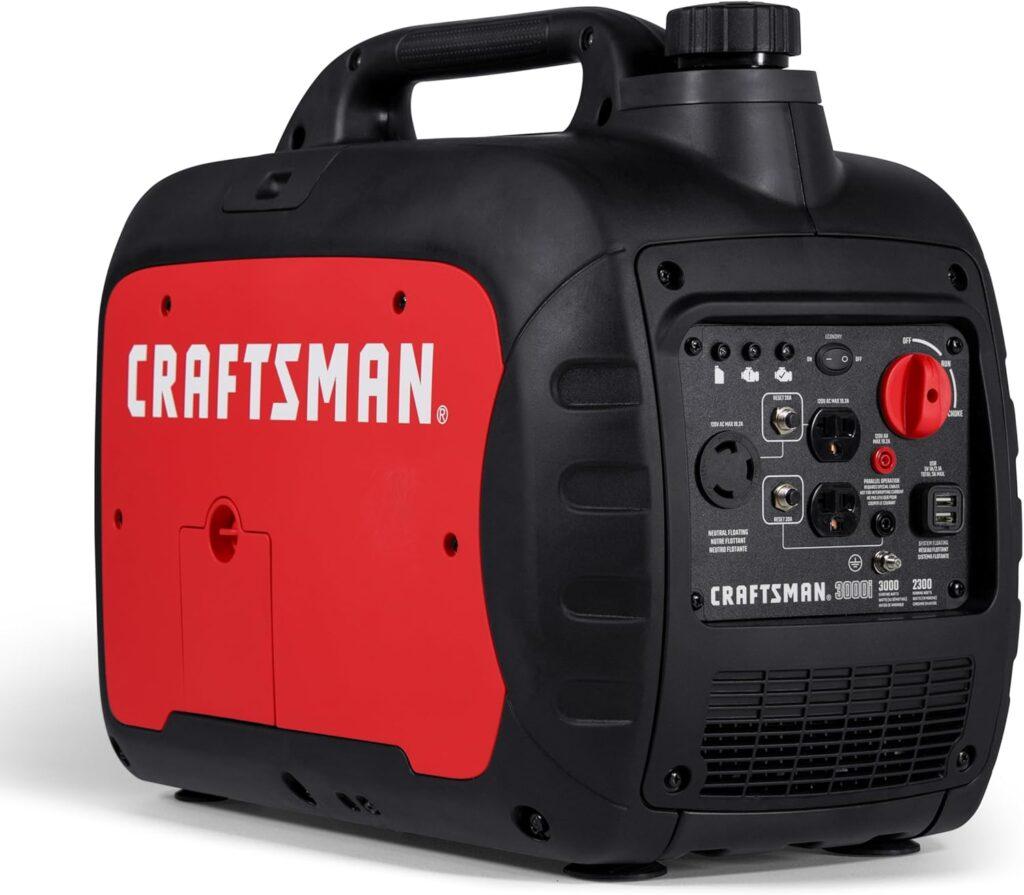
Key Specifications
- Brand: Craftsman
- Weight: 24.23 pounds
- Dimensions: 22.2″L x 13.3″W x 18.4″H
- Starting Watts: 3000 watts
- Running Watts: 2300 watts
- Noise Levels: Ultra-quiet (~58 dBA)
- Running Time: Up to 50 minutes
- Fuel Tank Capacity: 5 gallons
From our perspective, the Craftsman C0010030 is a compact, gas-powered generator designed for convenience and versatility. Its quiet operation and portability make it a practical choice for camping or smaller home backup needs.
Capacity Test
This generator performed efficiently, with its 3000 starting watts and 2300 running watts powering small appliances like mini refrigerators and fans seamlessly. It’s reliable for both outdoor activities and short-term power outages.
Noise Test
In our experience, the noise level was impressively low at around 58 dBA. This makes it ideal for camping and tailgating without disturbing nearby campers or neighbors.
Fuel Efficiency Test
The 5-gallon fuel tank delivered approximately 50 minutes of runtime at full load. For lighter loads, the runtime extended significantly, making it fuel-efficient for various applications.
Build Quality
The lightweight design and durable materials stand out. Its integrated handle and compact frame allow for easy transport, while the control panel’s covered outlets provide protection from dust and debris.
Safety Features
This model includes features like a low-oil shutdown to protect the engine and stable power output to safeguard sensitive electronics. These elements make it both safe and reliable.
Runtime, Fuel Options, and Tank Capacity Test
The Craftsman C0010030 runs on gasoline only, with the 5-gallon tank offering consistent power for short durations. For extended use, you may need to refill frequently, but the process is straightforward.
Ports and Essentials
The generator features four outlets, including standard 120V AC outlets, providing flexibility to power multiple devices simultaneously. This setup works well for essential appliances or tools.
Appliances Operated Using the Craftsman C0010030
Below are some of the appliances operated using the Craftsman C0010030, along with their starting and running wattages:
| Appliance | Starting Watts | Running Watts | Run Time (Approx.) |
| Mini Refrigerator | 800 | 500 | 45 minutes |
| LED Lights | 300 | 300 | 50 minutes |
| Laptop and Router | 200 | 150 | 50 minutes |
| Electric Fan | 300 | 200 | 50 minutes |
Pros
- Lightweight and portable
- Quiet operation for peace of mind
- Stable power for sensitive electronics
- Easy start-up process
Cons
- Short runtime at full load
- Limited to gasoline fuel
The Craftsman C0010030 is a versatile and portable generator offering reliable power for small-scale applications. It’s lightweight, quiet, and easy to transport, making it a proper addition to any camping or backup power setup.
From our perspective, this generator delivers portability, reliability, and quiet operation, making it an excellent choice for outdoor adventures or smaller household power needs. Its lightweight design and stable performance set it apart as a valuable option for versatile use cases.
What Is a Whole House Generator?
A whole house generator is basically a backup power system that keeps your entire house running during an outage. Unlike moderate portable generators that only cover a few things, this type connects directly to your home’s electrical system and powers everything from your lights to your fridge and even your air conditioning. The best part? It kicks in automatically when the power goes out, so you don’t have to do anything.
These generators usually run on natural gas or propane, which is convenient because they can keep going for a long time without constant refilling. They’re reliable and really useful, especially if you live in an area where power outages happen often. It’s peace of mind knowing that even when the power cuts out, your house stays lit and comfortable.
Getting one can be a game changer for keeping everything safe and running smoothly. Plus, they come in different sizes, so you can pick one that fits your home’s specific power needs. It’s definitely worth considering if you want to avoid being stuck without power for hours or even days.
How Power Is Transferred During an Outage In a Whole House Generator
So, here’s how it works when the power goes out: a whole house generator has something called a transfer switch that makes everything happen automatically. The moment it senses that the utility power is gone, it signals the generator to start. Within a few seconds, the generator kicks in and starts supplying electricity to your home.
The transfer switch is really important because it disconnects your house from the main power grid when the generator is running. This prevents electricity from backfeeding into the grid, which could be dangerous for utility workers trying to fix power lines. Once the generator is ready, the transfer switch routes power directly to your home’s circuits, making the transition smooth and almost unnoticeable.
When the utility power comes back, the transfer switch senses it and switches your home back to the main power source. It tells the generator to shut off, and everything goes back to normal. The whole process is automatic, so there’s no need to run around flipping switches or plugging things in. It’s simple and efficient.
What Are the Benefits of Using a Whole House Generator?
When the power goes out, a whole house generator can be a true lifesaver. It keeps everything running smoothly so that your home stays safe and comfortable. From ensuring reliability to adding value to your property, these generators come with many perks that make them worth considering.
Reliable Power for Your Home
Whole house generators provide continuous power during outages, which means your daily life doesn’t have to come to a standstill. Whether it’s keeping your refrigerator running or maintaining power for home offices, these generators make sure you don’t lose productivity or comfort. This reliability is especially beneficial for families with children or elderly members who rely on uninterrupted electricity.
Automatic Operation for Convenience
One of the standout features of whole house generators is their automatic operation. When the power cuts out, the generator kicks in automatically and powers your home. This means no running outside in the middle of a storm to set it up or flipping switches—everything happens without any effort on your part. When the power comes back, it shuts off by itself, keeping things simple.
Fuel Efficiency and Options
Whole house generators typically run on natural gas or propane, each with its own pros. Natural gas is often more convenient because it’s supplied directly through lines, so there’s no need to refill tanks. Propane, on the other hand, can be stored in large quantities and is great for areas without natural gas lines. Both fuel types are known for their efficiency and availability, making them practical options.
Added Property Value
Adding a whole house generator to your home can increase its resale value. Potential buyers see it as a significant advantage, especially in regions prone to power outages. A home equipped with a reliable backup power source is more attractive and can lead to better offers if you ever decide to sell.
How to Buy the Best Whole House Generator for Your Home?
Choosing the best whole house generator requires some careful thought. From power requirements to fuel options, there’s a lot to consider. By understanding what your home needs, you can pick the right generator to keep your household running smoothly during any outage.
Power Requirements of Your House – Calculating the Watts
To choose the right whole house generator, it’s important to calculate your home’s power needs. You’ll need to determine both the starting watts and running watts for the essential appliances you want to keep running during an outage. Here’s a basic formula you can use:
Watts = Volts x Amps
For example, if you have an appliance that runs at 120 volts and draws 8 amps, you would calculate the wattage like this:
Watts = 120 volts x 8 amps = 960 watts
This means the appliance requires 960 watts to run. Repeat this calculation for each major appliance you plan to power with the generator, and add them up to get the total wattage needed. This total will help you choose a generator with the appropriate capacity to keep your home running smoothly during an outage.
Home Appliances and Their Power Consumption
Knowing how much power your appliances use can make a huge difference in choosing the right generator. For example, refrigerators generally require around 600-800 watts, while air conditioners might need 2,000-5,000 watts. Water heaters and sump pumps also add to the total. Listing out the power consumption of key appliances can guide you in picking a generator that meets your home’s energy demands.
Choosing Between Air-Cooled and Liquid-Cooled Engines
Generators come with either air-cooled or liquid-cooled engines. Air-cooled engines are simpler and more affordable, suitable for homes with moderate power needs. Liquid-cooled engines, while more expensive, are ideal for larger homes or those with high energy demands, as they can handle extended use without overheating.
Evaluating Fuel Type and Performance
Different generators use different types of fuel. Natural gas is convenient and continuous, whereas propane can be stored and is useful for off-grid properties. Each fuel type affects the generator’s performance, runtime, and cost. Considering the fuel availability in your area can help you make the best choice.
Considering Noise Levels
Some generators can be quite loud, which might not sit well with your neighbors or your own comfort. When choosing a generator, look at the noise levels it produces, usually measured in decibels (dB). Quieter generator models are available and are worth the investment if you want to maintain a peaceful environment.
Reviewing Warranty Options
A generator is an investment, so a good warranty is essential. Look for warranties that cover parts and labor for several years. Some warranties may also offer service inclusions like annual maintenance checks. This can save you money and provide peace of mind, knowing that support is there if something goes wrong.
What Are the Drawbacks of a Whole House Generator?
While whole house generators offer many benefits, there are some downsides to consider before making an investment. Understanding these drawbacks can help you make a more informed decision and prepare for the potential challenges of owning a generator.
High Initial Costs
One of the biggest drawbacks of a whole house generator is the high upfront cost. Purchasing and installing a generator can be expensive, often ranging from $5,000 to $15,000 or more, depending on the generator’s capacity and features. For example, smaller air-cooled generators are usually less expensive, while larger liquid-cooled models with higher power output come at a higher price. Additionally, the installation process, which includes electrical and plumbing work, adds to the overall expense.
Maintenance Requirements
Whole house generators require regular maintenance to keep them running efficiently. Routine tasks include checking oil levels, replacing air filters, and inspecting the battery health. Maintenance should be done at least once a year or after heavy use. While some homeowners may choose to do basic upkeep themselves, professional maintenance services can cost between $200 and $600 annually, depending on the type of generator and service plan. Skipping maintenance can lead to more significant issues down the road, so it’s important to budget for these ongoing expenses.
Potential Noise Concerns
Noise can be an issue for some whole house generators, especially older or less advanced models. The sound of a generator running can be disruptive, which may not sit well with neighbors or even your own household. To mitigate noise, you can look for models specifically designed to operate quietly or install soundproof enclosures to reduce the noise level. Choosing a quieter model might be more expensive, but it can make a significant difference in maintaining a peaceful home environment.
Fuel Dependence and Availability
Another challenge is fuel dependence and the availability of fuel in certain areas. Whole house generators typically run on natural gas or propane. While natural gas is supplied directly through pipelines and provides continuous access, it may not be available in all regions. Propane requires a storage tank that needs refilling, which can be inconvenient during severe weather or long outages. Before choosing a generator, it’s essential to consider your local fuel options and decide which type is most practical for your area.
How to Maintain Your Whole House Generator for Longevity?
Regular maintenance is key to ensuring your generator stays in good shape and ready to work when you need it most. With proper care, a generator can run efficiently for years and provide reliable backup power during outages.
Routine Maintenance Tips
To keep your generator functioning properly, follow some basic maintenance tips. Check the oil levels regularly and change the oil according to the manufacturer’s recommendations. Inspect and replace air filters to ensure the engine is getting enough clean air. Don’t forget to check the battery health—generators rely on batteries to start, so it’s important they’re in good condition. Setting up a maintenance schedule, like checking everything every few months or after a big storm, can help you stay on top of things.
Troubleshooting Common Issues
Even with regular maintenance, issues can come up. Common problems include the generator failing to start, low power output, or unexpected shutdowns. To troubleshoot, make sure the fuel supply is steady, check for tripped circuit breakers, and inspect the connections for any loose wires. If these basic steps don’t solve the problem, it might be time to call in a professional.
Importance of Professional Servicing
While some maintenance can be done on your own, periodic professional servicing is essential. Professionals can perform detailed inspections, tune-ups, and identify potential issues before they become serious. This type of servicing can extend the life of your generator and keep it running smoothly. Regular professional checks, typically done once or twice a year, are a worthwhile investment for long-term reliability.
Wrapping It Up!
In conclusion, while whole house generators, such as the emergency standby option like Generac 7210 24kW Air Cooled Guardian Series, are a significant investment, their benefits in providing continuous power and ensuring comfort and safety during outages are invaluable. Whether you’re considering an emergency generator for home or exploring home emergency generators, understanding both the advantages and drawbacks helps homeowners make an informed decision. From the convenience of automatic operation to the reliability offered by models like the value for money option like Westinghouse WGen9500TFc Tri-Fuel, these generators serve as vital backups for those who prioritize uninterrupted energy.
However, it’s essential to consider the initial costs, routine maintenance, and potential noise levels that come with owning a generator. Planning for ongoing maintenance and evaluating local fuel availability can help minimize challenges. With proper care and professional servicing, a generator, like the budget option: WEN DF1100T 11,000-Watt, can provide long-lasting, reliable power support, adding value and peace of mind to your home. Whether it’s an emergency backup generator or an emergency power generator for home use, proactive planning ensures smooth performance.
Ultimately, investing in a whole house generator ensures your household stays functional and comfortable, even in unexpected power outages. By choosing a model that fits your power needs, evaluating fuel options, and maintaining it regularly, you can maximize the benefits and minimize potential issues. This proactive approach keeps your generator running smoothly, ensuring it’s ready to provide backup power when you need it most.
Related FAQs
How Long Can A Whole House Generator Run?
The runtime depends on fuel type and load; typically, it can run for 12-48 hours on a full fuel supply.
What Is The Average Lifespan Of A Whole House Generator?
Most whole house generators last between 10-30 years with proper maintenance and care.
How Much Does It Cost To Install A Whole House Generator?
Installation costs range from $2,000 to $5,000, influenced by size and complexity of setup.
How Often Should A Whole House Generator Be Tested?
Generators should be tested weekly with an automatic exercise cycle to ensure they remain operational.
Are Whole House Generators Safe To Use During Storms?
Yes, they are built to operate safely in storms, but proper installation is crucial for safety.
At our core, we’re a group of passionate generator, inverter, solar energy, battery enthusiasts. We dive deep into the world of tech, especially when it’s about powering your home, RV or outdoors. We try to provide as much value to the readers with our information and how to blog articles as possible. For affiliate articles our honest and transparent reviews of essential tech products are rooted in real-world experience. We take great satisfaction in offering unbiased evaluations, ensuring that you can make informed decisions when investing in your desired techs.

